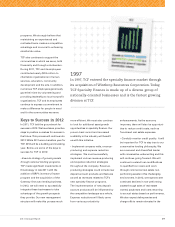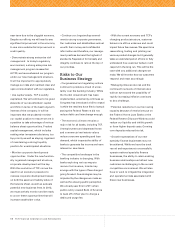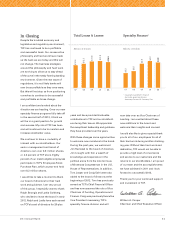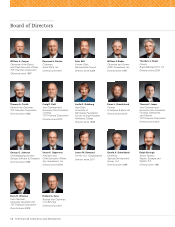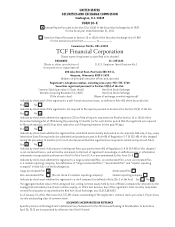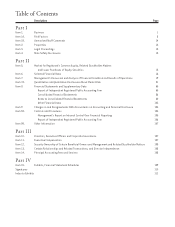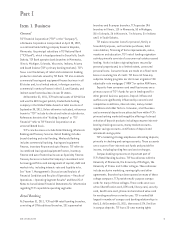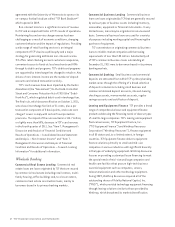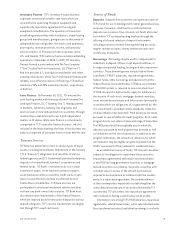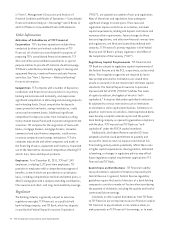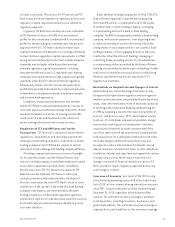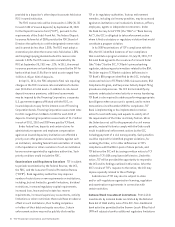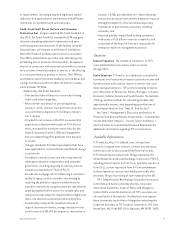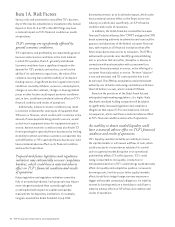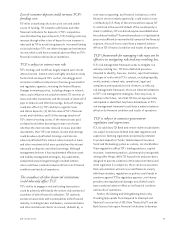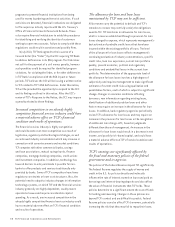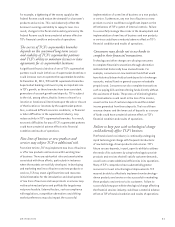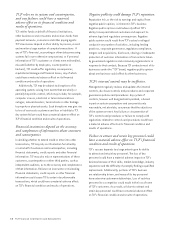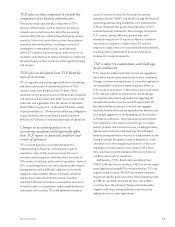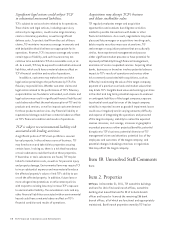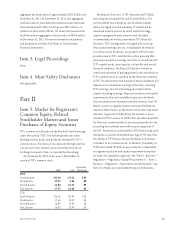TCF Bank 2011 Annual Report Download - page 23
Download and view the complete annual report
Please find page 23 of the 2011 TCF Bank annual report below. You can navigate through the pages in the report by either clicking on the pages listed below, or by using the keyword search tool below to find specific information within the annual report.its other cash needs. The ability of TCF Financial and TCF
Bank to pay dividends depends on regulatory policies and
regulatory capital requirements and may be subject to
regulatory approval.
In general, TCF Bank may not declare or pay a dividend
to TCF Financial in excess of 100% of its net retained
profits for the current year combined with its net retained
profits for the preceding two calendar years without prior
approval of the OCC. TCF Bank’s ability to make future
capital distributions will depend on its earnings and ability
to meet minimum regulatory capital requirements in effect
during current and future periods. These capital adequacy
standards may be higher in the future than existing
minimum regulatory capital requirements, including
the potential effects of any U.S. regulatory rule-making
relating to the implementation of the capital and liquidity
standards under Basel III, the international regulatory
framework for banks. The OCC also has the authority to
prohibit the payment of dividends by a national bank when
it determines such payments would constitute an unsafe
and unsound banking practice.
In addition, income tax considerations may limit the
ability of TCF Bank to make dividend payments in excess of
its current and accumulated tax earnings and profits. Annual
dividend distributions in excess of earnings and profits
could result in a tax liability based on the amount of
excess earnings distributed and current tax rates.
Regulation of TCF and Affiliates and Insider
Transactions TCF Financial is subject to Federal Reserve
regulations, examinations and reporting requirements
relating to bank holding companies. Subsidiaries of bank
holding companies like TCF Bank are subject to certain
restrictions in their dealings with holding company affiliates.
A holding company must serve as a source of strength
for its subsidiary banks, and the Federal Reserve may
require a holding company to contribute additional capital
to an under-capitalized subsidiary bank. In addition,
the OCC may assess TCF if it believes the capital of TCF
Bank has become impaired. If TCF were to fail to pay
such an assessment within three months, the Board of
Directors must cause the sale of TCF Bank’s stock to cover
a deficiency in the capital. In the event of a bank holding
company’s bankruptcy, any commitment by the bank
holding company to a federal bank regulatory agency to
maintain the capital of a subsidiary bank would be assumed
by the bankruptcy trustee and may be entitled to priority
over other creditors.
Under the Bank Holding Company Act of 1956 (“BHCA”),
Federal Reserve approval is required before acquiring
more than 5% control, or substantially all of the assets,
of another bank, or bank holding company, or merging
or consolidating with such a bank or bank holding
company. The BHCA also generally prohibits a bank holding
company, with certain exceptions, from acquiring direct
or indirect ownership or control of more than 5% of the
voting shares of any company which is not a bank or bank
holding company, or from engaging directly or indirectly
in activities other than those of banking, managing or
controlling banks, providing services for its subsidiaries,
or conducting activities permitted by the Federal Reserve
as being closely related to the business of banking. Further
restrictions or limitations on acquisitions or establishing
financial subsidiaries may also be imposed by TCF’s
regulators or examiners.
Restrictions on Acquisitions and Changes in Control
Under federal law, interstate merger transactions may
be approved by federal bank regulators without regard to
whether such transactions are prohibited by the law of any
state, unless the home state of one of the banks opted out
of the Riegle-Neal Interstate Banking and Branching Act
of 1994 by adopting a law after the date of enactment of
such act, and prior to June 1, 1997, which applies equally
to all out-of-state banks and expressly prohibits merger
transactions involving out-of-state banks. Interstate
acquisitions of branches by banks are permitted if the
law of the state in which the branches are located permits
such acquisitions for a state bank chartered in such state.
Interstate mergers and branch acquisitions may also
be subject to certain nationwide and statewide insured
deposit maximum concentration levels or other limitations.
In addition, federal and state laws and regulations contain
a number of provisions which impose restrictions on
changes in control of financial institutions such as TCF
Bank, and which require regulatory approval prior to any
such changes in control.
Insurance of Accounts As a result of the FDIC issuing
a Final Rule implementing section 343 of the Dodd-Frank
Act in 2010, all non-interest bearing transaction accounts
at all FDIC-insured institutions are fully insured through
December 31, 2012, regardless of the balance of the
account. The unlimited insurance coverage is available
to all depositors, including consumers, businesses, and
government entities. This unlimited insurance coverage is
separate from, and in addition to, the insurance coverage
52011 Form 10-K


